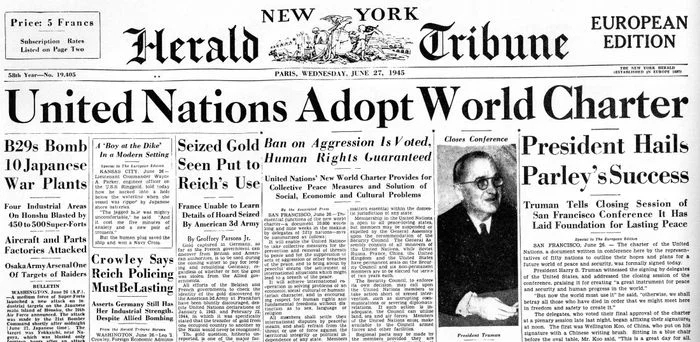Geopolicy and the united nations’s biggest struggle
June 26, 1945: the United Nations’ Charter is signed in San Francisco
On December 6th 2017, the United States’ president, Donald Trump recognized Jerusalem as the capital of Israel. This move did not only upends decades of American policy, it also appeared to put the United States at odds with the United Nations Security Council. Indeed, by violating the United Nations’ resolution concerning Jerusalem, the United States of America illustrate one of the dangers of the actual geopolicy.
Lately the geopolitical relations have appeared to be more and more chaotic. These micro conflicts and migration flows marked by blind violence (terrorist attacks and civilians massacres) have seemed rather endless.
Ever since 1945, the international order has always been troubled by crisis and conflicts. However, social and humanist principles steaming from the after-war conferences -social rights (Philadelphia) and the prohibition of war (San Francisco, UN creation)- remained geopolitical pillars. From 1945 to 1990, the rules were clear, written in the stone of the UN Charter. Naturally, the strongest countries (the P5), using their veto right, often bended the rules to operate on their respective areas of influence. Moscow acted mostly in Eastern Europe, Washington in Central America, Paris in Africa and Israel in its neighborhood. Nevertheless, these leading powers, didn’t openly violate the charter. The UN charter was an international landmark and a trust contract, allowing violence only under legitimate self defence matters.
Anyhow, in 1990 we witness an attempt to modify the international rules, particularly those concerning war rights. Imposed by the Western powers under the precedence of
M.William Clinton (1993-2001), this major shift is one of the main causes of today’s international relations’ instability.
The very same year, the Security Council authorised the military intervention thirty five countries against Baghdad ( August 2dn 1990- February 28th 1991) on behalf of the common security. This turning point marks with a certain enthusiasm “the new international order” that could allow the reign of right over force and the good over the evil.
Yet in 1999, the intervention of the North Atlantic Treaty Organisation in Kosovo created tensions. Besides, the Belgrade bombing which occurred without the endorsement of the UN, encouraged the raging “war propaganda” by the medias that had shadowed this decade. In this Kosovo affair, the American diplomacy managed to breach the International Charter by convincing world leaders (including France, Belgrade’s historical allie) to choose the military alternative when peaceful roads could still be taken. As a consequence, they broke the national order with the help of both the United Kingdom and France. In March 1999, the USA and its allies launched an aerial bombing operation, resulting in the capitulation of Belgrade three months later. This “use of force” that was not planned by the Security Council will find its renewal in the American attack against Iraq in 2003, this time without the support of Paris.
The Kosovo War therefore showed to many member states the reassessment of a pillar of the UN charter. Indeed, the disrespect of the limits imposed by borders and the dismantling of a member state ( the Federal Republic of Yugoslavia) was strictly forbidden. The 90’s thus paved the way to a modification of the political and legal equilibrium by the enlargement of the legitimate circumstances needed to go to war.
In 2005 after all these major events, the General Assembly assessed the new effects of one of its main pillar, the “responsibility to protect”. A government has responsibilities towards its citizens but cases such as the 2011 intervention in Libya does not fall under this duty.
However, ever since the Kosovo war, the current Russian diplomacy still stresses, whenever possible, that she was denied the right to do in Abkhazie, in Ossett and in Crimea what the Western leaders did in Kosovo.
Indeed, Russia and the People’s Republic of China are feeling quite deluded, as within the International Security Council, 70% of the resolution are mostly taken by the P3 (USA, UK and France). The emerging countries are slowly coming to finally claim their place at the international banquet. In 2008, Moscow makes a major comeback on the international scene by operating in Ossett and in Abkhazie, followed by Pekin who refuses to apply the permanent resolution concerning its disagreement upon the China Sea with the Philippines.
The debates within the Security Council change and both Moscow and Pekin remind the Western countries of the rules imposed by the UN with great pleasure, even if themselves pay little attention to the fundamental rights.
On that account, geopolicy is to not to be underrated and international relations should be used be entertained with the delicacy when diplomacy has become more crucial than ever.
An article by IMANE JACOBS

